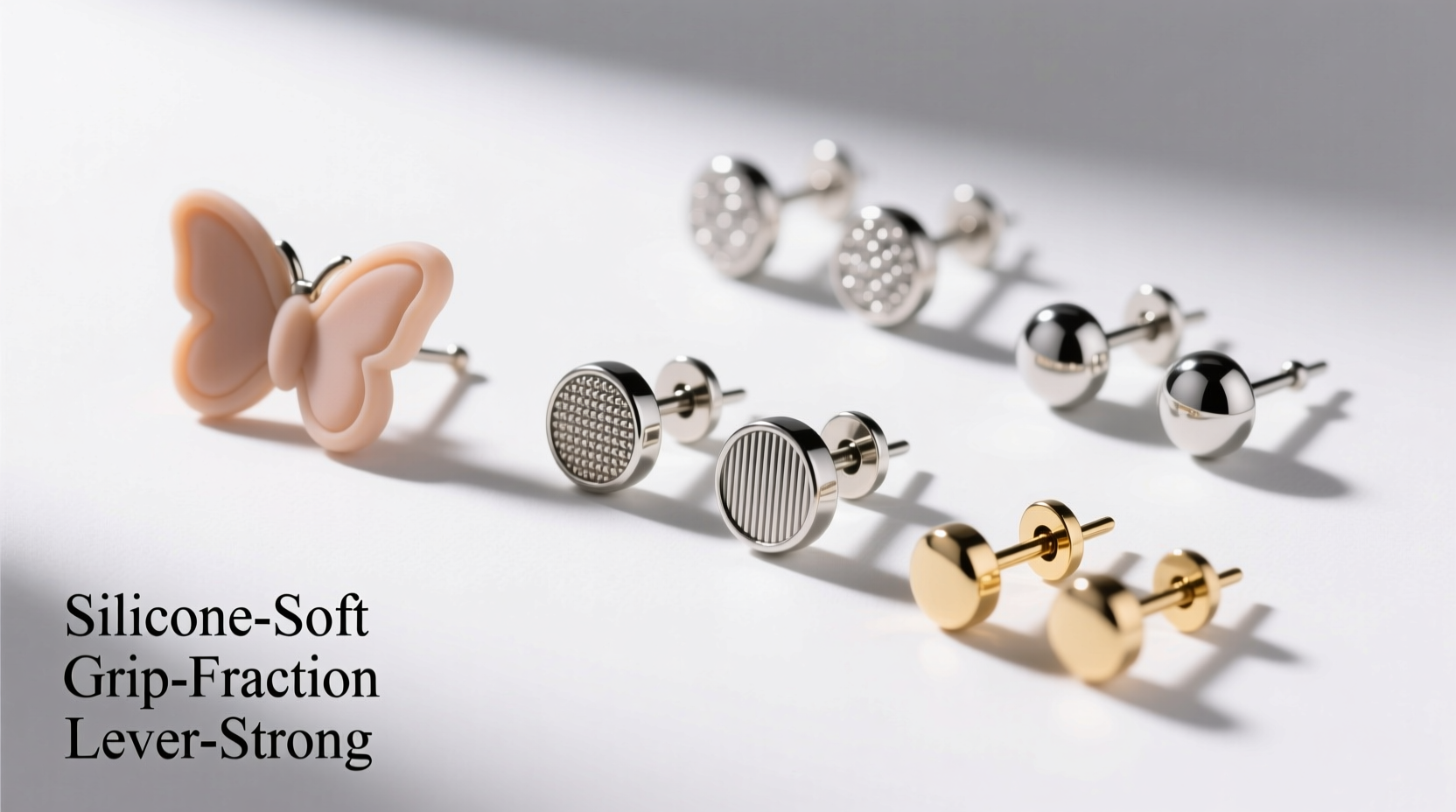Stud earrings are timeless—minimalist, elegant, and versatile enough to wear from day to night. But no matter how beautiful the design, a poorly chosen earring back can turn a favorite pair into a source of irritation or even loss. The right back keeps your studs securely in place while ensuring all-day comfort. Yet many people overlook this small but critical component, assuming all backs are created equal. They’re not.
From lightweight sleepers to statement gemstones, different studs require different types of backs. Whether you have sensitive ears, lead an active lifestyle, or simply want to avoid losing precious jewelry, understanding the options is essential. This guide breaks down the most common earring back types, their benefits and drawbacks, and how to match them to your needs.
Understanding Earring Back Types: A Comparative Overview

Earring backs may seem interchangeable, but each type offers unique advantages in terms of security, comfort, and ease of use. Below is a detailed comparison of the five most widely used styles.
| Type | Security Level | Comfort | Best For | Common Issues |
|---|---|---|---|---|
| Butterfly (Friction) Backs | Low-Moderate | Moderate | Casual wear, lightweight studs | Can loosen over time, may pinch skin |
| Silicone Sockets | Low | High | Sensitive ears, children | Easily lost, degrade over time |
| Screw Backs | High | Moderate | Valuable stones, active lifestyles | Harder to put on, may strip posts |
| Lever Backs (Omega) | Very High | High | Heavy studs, formal events | Bulkier, less common |
| Push Backs with Silicone Sleeves | Moderate-High | High | Daily wear, sensitive ears | Sleeves may need replacement |
Matching Your Lifestyle to the Right Back
Your daily routine plays a major role in determining which earring back suits you best. A desk job requires different considerations than frequent workouts, travel, or nighttime wear.
If you're frequently touching your hair or wearing hats and helmets, friction backs may not provide enough hold. In contrast, screw backs offer excellent retention but can be cumbersome if you change earrings often. For those who sleep in earrings—especially new piercings—soft silicone or cushioned push backs reduce pressure and prevent snagging.
The Problem with Standard Butterfly Backs
Butterfly backs, also known as friction backs, are the default option included with most stud earrings. They rely on tension against the post to stay in place. While inexpensive and easy to use, they come with notable downsides.
- They gradually lose tension over time, increasing the risk of loss.
- The metal wings can press uncomfortably against the earlobe, especially during sleep.
- Thin or flimsy versions may bend easily, making removal difficult.
For occasional wear with lightweight studs, butterfly backs are acceptable. But for long-term comfort and security, upgrading is worth considering.
Materials Matter: Skin Sensitivity and Durability
The material of both the earring post and the back affects comfort and safety. Nickel is a common allergen found in low-cost metals and can cause redness, itching, or swelling. If you have sensitive skin, opt for hypoallergenic materials such as surgical-grade stainless steel, titanium, or 14k gold.
Similarly, the backing itself should be non-reactive. Silicone sleeves are gentle but may harbor bacteria if not cleaned regularly. Rubberized coatings can degrade and leave residue. Solid metal screw backs are durable but may feel cold or stiff initially.
“Many patients come to me with irritated lobes only to discover it’s not the earring front causing the issue—it’s the back. A simple switch to a medical-grade silicone or titanium back can make all the difference.” — Dr. Lena Torres, Dermatologist & Skin Health Specialist
Step-by-Step Guide to Choosing Your Ideal Earring Back
Selecting the best back isn’t guesswork. Follow this process to find the perfect match for your earrings and lifestyle.
- Assess your earring weight. Lightweight studs (under 1g) work well with butterfly or silicone backs. Heavier stones or metal designs need screw or lever backs.
- Evaluate your activity level. Do you exercise, swim, or move frequently? High-motion activities demand secure closures like screw or omega backs.
- Consider sensitivity. If your ears react to certain metals, prioritize hypoallergenic backs made from titanium or coated in medical-grade silicone.
- Test for comfort. Wear potential backs for several hours. Note any pressure points, especially behind the earlobe.
- Check compatibility. Ensure the inner diameter of the back matches the thickness of your earring post (typically 0.8mm–1.2mm).
Real-World Example: Avoiding a Costly Loss
Sophia, a yoga instructor, loved her diamond stud earrings but kept losing one after class. She assumed she was just careless—until she realized her butterfly backs were slipping off during inversions. After switching to screw backs, she never lost another earring. “It was such a small change,” she said, “but it saved me hundreds. Plus, my ears don’t ache at the end of the day.”
This is a common scenario. Physical movement, sweat, and repeated head motion compromise standard backs. Active professionals—from dancers to nurses—benefit significantly from upgraded security.
Expert Tips for Long-Term Earring Care
Even the best back will fail if neglected. Regular maintenance ensures lasting performance and hygiene.
- Tighten screw backs gently—over-tightening can damage the thread on the post.
- Replace silicone sleeves every 3–6 months or when they become brittle.
- Store extra backs in a small compartmentalized case to avoid misplacing them.
- Carry a spare set of secure backs when traveling.
Frequently Asked Questions
Can I use different backs with any stud earring?
Most stud earrings use standard post sizes (approximately 1mm), so many backs are interchangeable. However, always check the post thickness before switching. Some designer or vintage pieces may have non-standard dimensions.
Are screw backs better than butterfly backs?
Screw backs are more secure and ideal for valuable or heavy earrings, but they require more effort to apply and remove. Butterfly backs are convenient for everyday use but less reliable for active settings. The best choice depends on your priorities: convenience vs. security.
How do I stop my earring backs from falling off?
First, ensure the back fits snugly on the post. If it feels loose, try a new back or upgrade to a screw or lever style. Adding a silicone sleeve can also improve grip. Finally, consider using locking mechanisms or earring clips for added peace of mind.
Final Checklist: Choosing the Best Earring Back
- ✅ Identify earring weight
- Determine if your studs are light, medium, or heavy.
- ✅ Match back type to activity
- Choose secure options for sports, travel, or high-movement jobs.
- ✅ Prioritize hypoallergenic materials
- Select titanium, surgical steel, or gold for sensitive skin.
- ✅ Test comfort over time
- Wear the back for a full day before committing.
- ✅ Maintain and replace regularly
- Clean backs monthly and replace worn components.
Conclusion
The perfect pair of stud earrings deserves the right companion—a back that keeps them safe, comfortable, and secure. By understanding your needs and exploring alternatives beyond the basic butterfly, you protect your investment and enhance your wearing experience. Whether you prioritize comfort, security, or skin sensitivity, there’s a back designed for your lifestyle. Don’t let a tiny piece of metal undermine your favorite accessory. Make the switch today and feel the difference in every wear.









 浙公网安备
33010002000092号
浙公网安备
33010002000092号 浙B2-20120091-4
浙B2-20120091-4
Comments
No comments yet. Why don't you start the discussion?